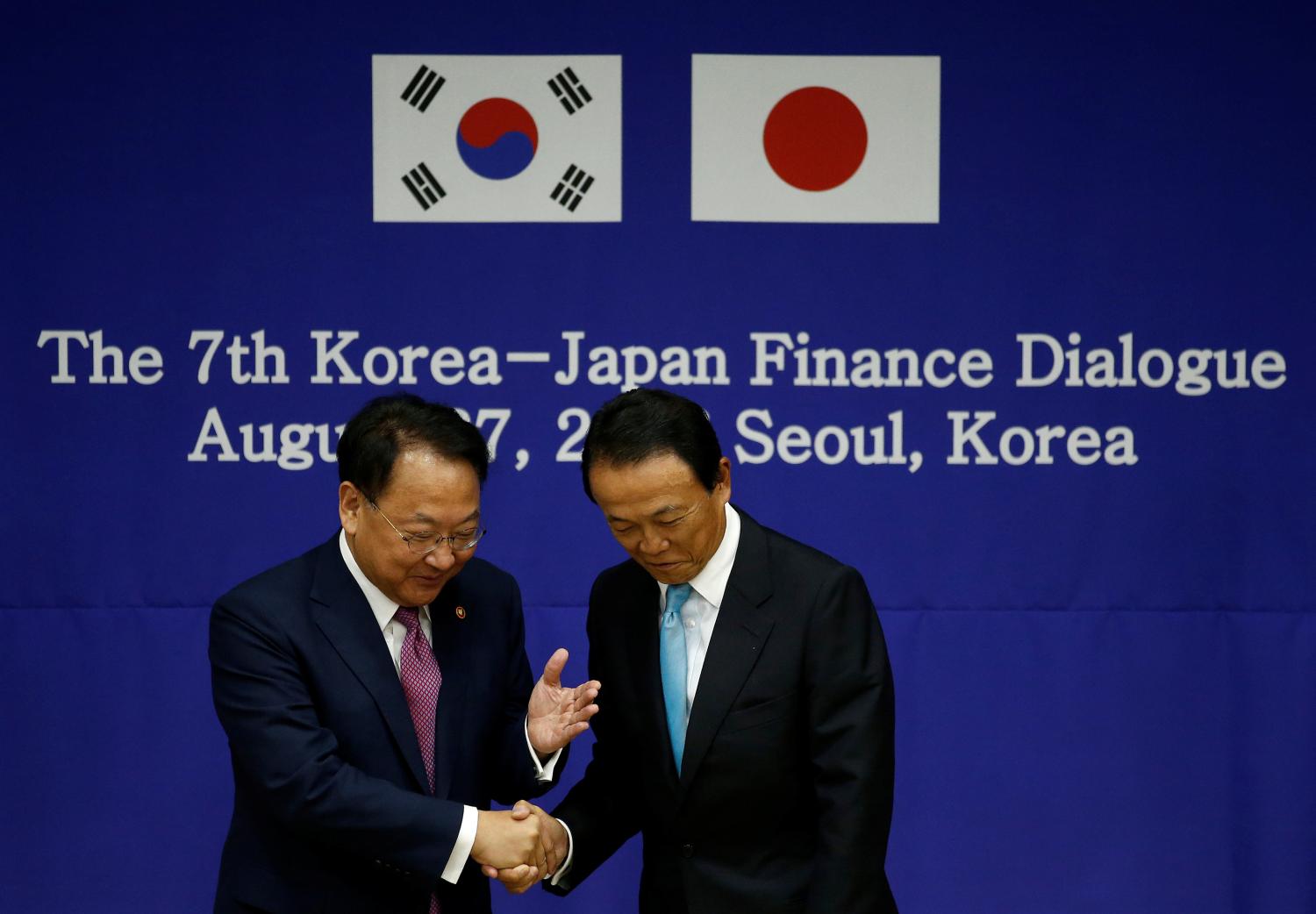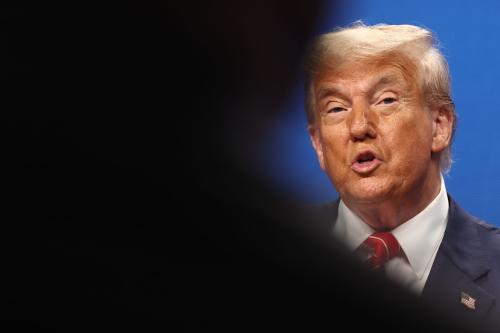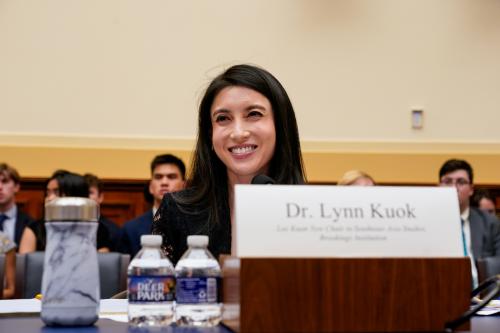On February 25, Lee Myung-bak will be inaugurated as the tenth president of the Republic of Korea. President-elect Lee is a member of the conservative Grand National Party (GNP or Hannara-dang), and his inauguration ends ten years of rule by progressive presidents; it is the second transition in power from the ruling party to the opposition since South Korea’s democratic transition in 1988. In contrast to American inaugural ceremonies, in which the symbolism of checks and balances is played out both through legislative roles and the swearing-in of the American president by the Chief Justice of the Supreme Court, South Korea’s president has traditionally by his own initiative publicly sworn his own oath directly to the people.
But the symbolism of an imperial presidency is no longer adequate to reflect the vibrancy of South Korea’s democracy or the reality that power and responsibility have been diffused to other power centers within Korean government and society. Nor will such an oath reflect the biggest challenge Lee Myung-bak will face as South Korea’s next president: the need to provide leadership by forging and promoting social consensus within South Korea.
When the ceremony and symbolism of the inauguration have faded, the new administration will face a number of important challenges, all exacerbated by the need to foster a national consensus. President Lee will have to reach across party and social lines to manage challenges in the economy, relations with the United States and other foreign powers, inter-Korean engagement, and—not least—South Korea’s uncertain political environment.
The economy: will it take off?
Given his pro-business policies, Lee is well-suited to make his mark as “salesman-in-chief” for Korean economic interests at home and abroad. During South Korea’s election campaign, Lee pledged to build a canal across Korea to promote national economic integration and his “747” economic plan pledges to promote 7 percent annual economic growth, raise South Korea’s per capita GDP to US$40,000, and to make South Korea the seventh largest economy in the world. The hope of the South Korean public is first and foremost that Lee will revitalize South Korea’s economy to meet the challenges of global competition.
To succeed in this task, Lee will have to overcome longstanding structural and political challenges to greater Korean economic growth. Most South Koreans want economic growth with equity and revised labor laws that will unleash productivity rather than limit the economy’s growth potential, and for the government to provide a fair regulatory environment in which even South Korea’s largest corporations are held accountable to domestic law and international standards of governance. Lee’s experience in international business will leave its mark on South Korea’s international profile. He will promote international standards in economic policy, and will make larger contributions in the spheres of development assistance and UN peacekeeping, especially given South Korea’s higher profile as the home country of the Secretary General of the United Nations.
An early test of Lee’s skills will be his effort to win passage from the U.S. Congress of KORUS FTA, the free trade agreement negotiated by the predecessor Roh Moo-hyun administration. Early passage of the KORUS FTA would affirm Lee’s priority on improving South Korea’s relationship with the United States, but it also serves as a springboard for South Korea’s negotiation of FTAs with its immediate neighbors, Japan and China. Since Lee’s greatest power and domestic political support will come at the beginning of his administration, he is well-positioned to garner Korean support for the agreement; the bigger test will be whether he can convince the U.S. Congress that the FTA is about the strategic relationship with Korea and not simply about specific economic sectors. Failure to gain support for the KORUS FTA would set back the relationship with the United States and erode Korean leverage in FTA negotiations with Asian neighbors.
Korea’s great power relations: balanced but not a balancer
Lee and his foreign policy advisors have spoken about the need to restore the relationship with the United States by revitalizing the U.S.-ROK security alliance, possibly through a joint vision statement between the two presidents. Specifically, Lee’s transition team has already considered joining the American-led missile defense program and the Proliferation Security Initiative, which many in Washington would welcome. But Lee’s aides have also discussed pushing back the timetable for disbanding the Combined Forces Command in favor of a South Korean-led wartime operational control system, an issue on which senior Pentagon officials do not want to re-open discussion.
While Lee’s emphasis on relations with the United States is welcome in Washington, Lee will want to be careful to underscore that this is a bipartisan initiative. One way of doing this would be to affirm the importance of the alliance at a summit meeting with President Bush and to initiate a comprehensive bi-national process to strengthen institutional cooperation. This process would create a positive environment—and more importantly, a concrete early deliverable—that would be consummated in 2009 during Lee’s first summit meeting with Bush’s successor.
Lee has also indicated his desire to have “future-oriented” relations with Japan, setting aside history issues and hoping that Japanese leaders will do the same. Japanese Prime Minister Yasuo Fukuda’s acceptance of an invitation to Lee’s inauguration suggests an early opportunity to consolidate South Korea-Japan relations. South Korea under Lee Myung-bak will seek a balanced foreign policy while eschewing the “balancer” role articulated by Roh Moo-hyun. At the same time, Lee has made it no secret that his first priority is to revitalize the relationship with the United States by making the alliance a platform for South Korea’s regional engagement.
A perennial South Korean foreign policy objective has been the successful management of ties with each of the four major powers surrounding the Korean peninsula: Japan, Russia, China, and the United States. Although Lee has also prioritized good relations with China and Russia by sending special envoys to Beijing and Moscow, there are early signs that Lee’s emphasis on the United States and Japan is making China uneasy while South Korea’s relationship with Russia continues to underperform its potential.
Inter-Korean relations: shifting priorities
North Korea’s delay in implementing denuclearization commitments may present an early policy challenge for Lee Myung-bak, a factor likely to make more complicated the delicate task of managing the transition in inter-Korean relations from the Roh Moo-hyun to the Lee Myung-bak administration. This transition is particularly delicate because although Lee himself has supported engagement of North Korea, the Sunshine and Peace and Prosperity Policies of his immediate predecessors never received political support from the then-opposition Grand National Party.
Aside from already-existing bureaucratic channels, there are few personal relationships between Lee’s camp and leaders in Pyongyang. There is little reason to expect that North Korea will cooperate with apparent efforts to deemphasize North Korea as a priority for South Korean policy. Current efforts by the Lee Myung-bak transition team to merge the Ministry of Unification into the Ministry of Foreign Affairs and Trade must give the leadership in Pyongyang pause, although the North has thus far shown restraint in criticizing such a move.
In some respects, the inter-Korean relationship will be starting over again under Lee Myung-bak, who has been willing to publicly criticize the North on human rights grounds—a taboo under the Roh administration—and has demanded the North’s denuclearization as a precondition for his Vision 3000 policy that offers a generous financial and technical support package for North Korea’s development. However, food and fertilizer assistance have already been declared exempt from this requirement, in contrast to the Roh administration’s decision to withhold fertilizer assistance in 2007 until the North finally began in June to implement the February 13, 2007 agreement.
Thus far, signs are that while Lee Myung-bak supports continued inter-Korean engagement, the priority attached to North Korean issues will be lowered considerably compared to predecessor administrations that had elevated inter-Korean relations as a policy priority. Cuts in the budget for inter-Korean cooperation and the envisioned government reorganization that abolishes the Ministry of Unification suggest that Lee Myung-bak does not intend to make relations with North Korea a policy priority. North Korea more than anything does not like to be ignored.
The North may calculate that further delay in providing a complete declaration of its nuclear programs, as agreed to on February 13, 2007, would be an effective way to test both Lee Myung-bak and the ability of the new Korean administration to coordinate effectively with the United States and to maintain the support of its own citizens. Or, delay could be used as a tactic by the North to test the extent to which Lee will really uphold the policy he has already articulated. North Korean delay may also be a tactic to instigate a limited crisis to prove that the North is an issue that can not easily be set aside. Although the North has withheld direct comment on Lee following his election, the Korean Central News Agency has objected to plans for renewed U.S.-Japan-ROK policy coordination, and Pyongyang certainly must not appreciate public talk of contingency planning for instability in North Korea.
Domestic politics: standing in the middle?
A potential challenge to Lee Myung-bak’s leadership capacity remains the management of South Korea’s domestic politics. Although the progressive parties have been decimated as a result of apparent disillusionment with Roh Moo-hyun’s political failures, Lee also faces an emerging challenge from his right in the form of a newly-established conservative party led by former GNP Chairman Lee Hoi-chang. This apparent fragmentation of Lee’s political base could weaken him prematurely, but for the moment the primary effect appears to be to push him toward the middle in ways that require him to embrace “pragmatism” in word and deed.
Likewise, Lee’s mandate will be influenced by how the progressive Uri party adapts to its opposition role. Thus, the April 9 general elections for the National Assembly will be a critical factor in shaping the domestic political parameters within which Lee operates as well as providing a referendum on the aggressive early efforts by the transition team to reorganize government and introduce the new priorities that are likely to characterize the foundation of Lee’s policy agenda. If Lee’s party is able to get a majority, he will have more latitude and support to push his own agenda despite criticisms from either the right or the left.
The Republic of Korea will celebrate the sixtieth anniversary of its founding in October, marking the completion of its first full life-cycle in traditional Asian philosophy. Lee Myung-bak’s task and opportunity as South Korea marks this anniversary will be to raise South Korea’s economic and political performance to its full potential as South Korea enters this new phase.
The Brookings Institution is committed to quality, independence, and impact.
We are supported by a diverse array of funders. In line with our values and policies, each Brookings publication represents the sole views of its author(s).




Commentary
Op-edInauguration of Lee Myung-bak: Grappling with Korea’s Future Challenges
February 11, 2008